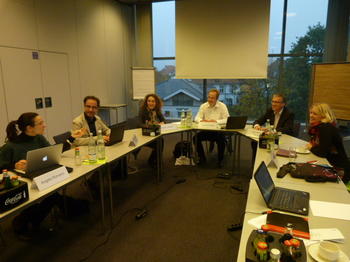Report: KFG Author’s Workshop "Cooperation, Competition, and Transfers: The EU among International Organizations"
Dec 03, 2015
Author’s Workshop "Cooperation, Competition, and Transfers: The EU among International Organizations". FLTR: Angela Romano, Victor Fernández Soriano, Oriane Calligaro, Wolfram Kaiser, Jan-Henrik Meyer, Birte Wassenberg, Kiran Klaus Patel
Image Credit: KFG
On 29 October 2015, KFG Senior Fellows Wolfram Kaiser and Kiran Klaus Patel held an author´s workshop in Berlin. A number of distinguished scholars examined how the EU is involved in exchange with other International Organizations. Resulting from the workshop, five papers that were discussed will be published in the European Review of History in 2016-17.
International Organizations (IOs) cooperate and compete with each other. They have multiple exchange relations facilitated by the IO secretariats, governments, parliamentary assemblies, and organized interest groups. From its inception, the present-day European Union has participated in such exchanges. Historians have hardly researched these inter-organizational relations, however. Like much of the social science research for a long time, historical research has implicitly assumed a central role of the EU in diffusing norms, ideas and policy solutions to other IOs or regional integration organizations (ROs).
In one of two research strands coordinated at the KFG, Senior Fellows Wolfram Kaiser (Portsmouth) and Kiran Klaus Patel (Maastricht) seek to promote fresh research on the EU’s exchange relations with other IOs and ROs in historical perspective. On 29 October 2015, they convened a second event devoted to this theme in the form of an author workshop. The participants discussed in-depth the advanced versions of five papers that will be published as a special section or special issue of the European Review of History in 2016-17.
In her paper Angela Romano (European University Institute) traced the emergence within European Political Cooperation of a particular approach to military security in the early 1980s which was then adopted by NATO. Víctor Fernández Soriano (Université Libre de Bruxelles) explored the role of human rights networks and the Council of Europe’s Parliamentary Assembly in shaping the reactions of IOs, including the EC´s reaction to the military coup in Greece in 1967. Jan-Henrik Meyer (NTNU Trondheim) looked at the transfers between the OECD and the EC in the evolution and definition of the `polluter pays´ principle in the early 1970s. In their co-authored paper, Oriane Calligaro (Université Libre de Bruxelles) and Kiran Klaus Patel highlighted, among other points, the role of the European Parliament and individual policy entrepreneurs in moving the cultural policy agenda from the Council of Europe to the EC. Finally, Birte Wassenberg (Institut d’Etudes Politiques Strasbourg) explored the longer tradition of the Council of Europe in fostering regional cross-border cooperation and the IO’s particular role in influencing the emerging EC policies in this field, including the Interreg program, for example.
The author workshop helped identify several vectors of transfers among IOs. Crucially, transfers into and out of the present-day EU have not just been promoted by governments and the European Commission as executive institutions. Several papers demonstrated the key role that the European Parliament and parliamentary assemblies in IOs played in taking up issues, searching for solutions within the larger field of IOs, and transferring policy ideas and solutions. The Parliamentary Assembly of the Council of Europe played a strong role in this regard, especially until the direct election of the EP in 1979, when dual membership in both assemblies ceased. Moreover, organized societal groups also promoted the transfer of policy ideas and solutions, as in the case of human rights groups after the Greek coup, for example. When the EU adopted models from elsewhere, it usually seized upon its legal integration and direct effect of its legislation as well as its budgetary resources as means to become a key player in the larger field of IOs. Subsequently, it has often transformed and re-exported institutional designs – a topic at the centre of the KFG’s research agenda.
KFG Senior Fellows Wolfram Kaiser and Kiran Patel are organizing an international conference to take place in Berlin in April 2016. Please find the Call for Papers From Empires to Empire? European Integration in Global Context, 1950s to 1990s here. The deadline for paper proposals is the 20 of December, 2015.
For further information on The Kolleg-Forschergruppe (KFG) "The Transformative Power of Europe" please clicke here.
